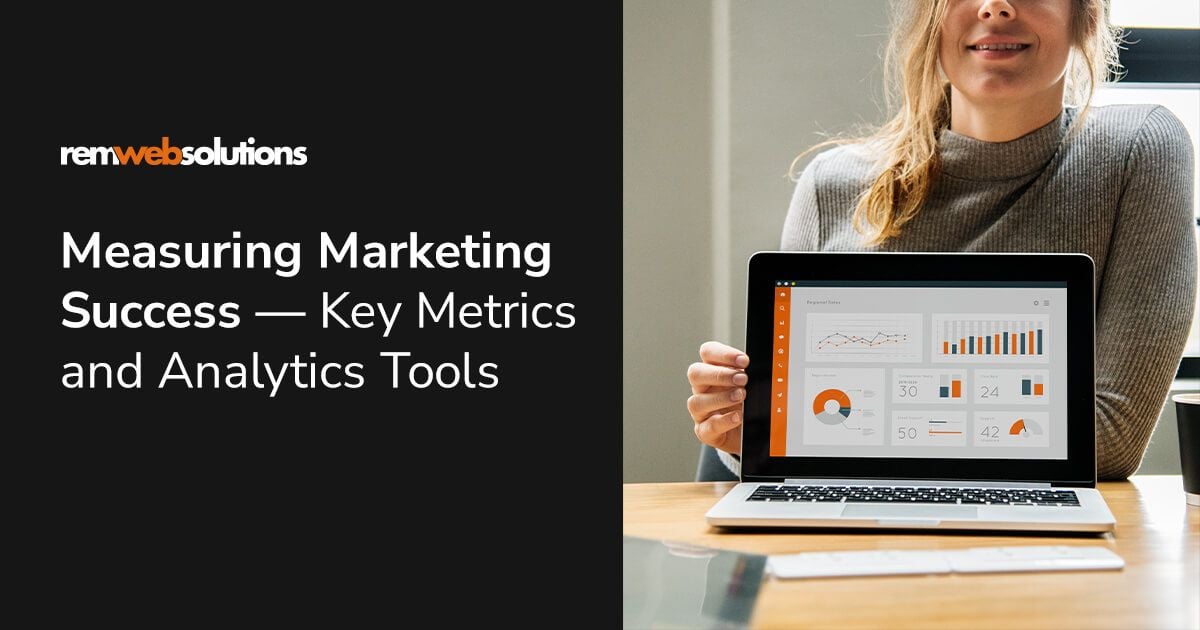
Ah, the wonderful world of marketing tools. There are so many of them and even more ways to implement them.
But what are some of the key metrics and analytics tools you can use to measure marketing success? We’re here to demystify that.
Digital marketing isn't just a means of connecting businesses with possible customers—it's about building a trustworthy reputation. You need to measure your digital marketing metrics to make sure you're implementing the best strategies for your business, but what should you be looking out for?
Let’s discuss, shall we?
You can't strictly rely on feelings when it comes to crafting your digital marketing campaign. Unfortunately, just like the weather, things can be unpredictable in the space—which is why tools exist to determine if you're meeting the necessary goals for maximum success.
However, tracking success isn't as easy as just counting how many customers you have. Digital marketing campaigns are tailored and comprehensive, utilizing several means of advertising across social media platforms, emails, web pages, blogs, and other tools designed to connect you with your broader audience. And if you approach it without having a means of measuring success, you're going to end up wasting time and money, and no one wants that!
So, you may be asking: REM Web Solutions experts, how do you properly measure your digital marketing success? Luckily, our writers have crafted a comprehensive guide on some of the top strategies you can easily integrate into your future campaign plans.
Why it's so Important to Track and Measure Your Digital Marketing Efforts
If you’ve ever worked out before, you’d know there's more than one way to measure your fitness success. However, working out doesn’t come with a singular successful outcome: some people work out with the intention of weight loss, others do it for cardiovascular health, and others do it to gain muscle—which means there are many ways to measure personal success based on your goals.
Digital marketing campaigns are very much the same.
Here are some of the reasons you need to track marketing metrics:
It ensures that your digital marketing efforts are effective and that you're reaching your target audience. So, to throwback to our original analogy, if you're a fitness brand that focuses on aiding muscle growth, your target audience would be individuals looking to work out to gain muscle. If you aren't reaching that target audience, you can pivot your strategies based on your collected data.
Watching your metrics helps you save money on your budget by only allocating funds to ads and methods that work for you and your business. Measuring that success also helps you save time by showing you the most important areas in which to focus your messaging and connect to the right customers.
Metris also help you to create markers that help demonstrate your growth over time and your overall return on investment (ROI).
How to Best Track and Analyze Your Digital Marketing Metrics
Sometimes determining the first step is the hardest, but knowing where to start can make it a little less intimidating. It's best to get started by setting very specific goals early on in your campaign, ideally before you even get it rolling. And the more specific, the better. Once you have clear objectives detailed and shared with your team, you can begin measuring your performance by looking at key performance indicators (KPIs).
What are KPIs?
KPIs in digital marketing refer to tangible metrics that show you targets and help you determine the progress of your campaign. This inherently helps you gauge your success and tailor your approach. For example: measuring your conversation rate is one of the most important KPIs, as it measures the percentage of customers visiting your website.
To start accurately tracking KPIs, you need to set a few things up:
Utilize Tracking Tools Across Several Platforms
The more you can automate the process of tracking your marketing metrics, the more you can accomplish in the least amount of time. In our technically advanced age, there are several marketing tools and platforms that can help you develop these processes.
Utilize Analytics
Ensure you make time to check your marketing performance by utilizing analytics across your marketing platforms, such as YouTube, Instagram, Facebook, Google, etc. Make sure you critically pour over graphs and available data and compare these marketing results with relevant industry KPIs. This helps you to determine what actually works and, most importantly, why it works.
It's important for you to create and compare your goals against these KPIs and make them a regular part of your campaign. This will allow you to better determine what works, what doesn't, and how you can adjust your campaign moving forward. That way, you're not missing out on meeting the desires and needs of your respective audience, encouraging them to come back for more.
Monitoring Website Traffic
One of the main goals of digital marketing is to bring customers to your website—ideally to buy your products and/or services. Businesses require you to turn clicks into purchases, right? Google Analytics offers a tangible, convenient tool for this, allowing you to track your incoming traffic metrics.
Measuring Overall Conversion Rates
Knowing how many people are coming to your website is nice, but what about how many visits actually result in sales? To properly calculate the conversion rate, you can use a simple equation of dividing the number of people who completed a sale by the total number of visitors to your website. That gives you an easy percentage to measure your success.
For example, say you had 50,000 visitors to your website in a month and made 2000 sales—that's a conversation rate of 4 per cent. The higher the conversion rate, the more you're ultimately getting out of your campaign's budget.
Measuring Cost per Acquisition (CPA)
The costs of your digital marketing campaign can pile up quickly if you're not optimizing your strategy, so you need to keep an eye on cost per acquisition (CPA) based on rate. Your CPA is going to indicate what each new customer costs your business, and it helps you to tailor and adjust your marketing efforts and costs based on how much customers are spending on your products and services. You should ideally be making back your campaign's costs and then some.
Don't be afraid to compare your CPA with common industry standards and product costs. But, it's important to keep in might that having a higher CPA isn't always a bad thing—especially in the case where you're selling expensive products and/or services. In such a case, it’s normal to see higher CPAs.
Monitoring Your Overall Return on Investment (ROI)
Ah, returns on investment (ROI)—this metric literally refers to the results of your marketing campaign when compared to the cost you put into it, making it a larger overall metric. For comparison, a CPA generally only focuses on the cost of your campaign ads, while ROI considers the costs associated with the methods and online tools you use—such as your website. If you're working with a marketing firm, you'll also want to account for that cost as well. You need to track your marketing costs for all of your platforms and then compare them to your overall revenue growth from the start point of your campaign to the present time.
When you want to measure your overall digital marketing ROI, you need to go beyond just monthly costs to get a good perspective on the average time it takes to see tangible results. It's not abnormal for a campaign to not generate new sales in a month, but you might have had 100 more people subscribe to your mailing list. Or, maybe you gained 1,000 new followers across your social media accounts, which can now be channeled into potential sales.
Your digital marketing campaign with new demographic metrics can also help you understand your target audience better, which can help further tailor your approach as you advance your campaign.
Monitoring Click-through Rate
A good key performance indicator is the click-through rate (CTR)—which refers to any digital campaign that includes a link to encourage potential customers to click and go to a specific landing page, such as a sales or contact page.
CTR is a valuable metric because it gives you a direct indication of just how engaged your customers are with your campaign's efforts. To properly calculate it, we have to once again do a bit of math: you need to divide the total number of clicks by the total number of impressions (also known as view-through), which is a good way to determine the number of times people see your ad.
Measuring Your Customer Lifetime Value (CLV)
Perhaps a less commonly discussed metric is customer loyalty. Sure, it's great to get a one-time purchase, but having loyal customers helps a business thrive in the long term, which is why measuring your CLV is essential.
CLV very literally refers to the value of a customer to your business over its lifetime. This KPI is essential for businesses that offer repeating services or even product subscriptions, as it gives you a better overview of what investments you're getting a return on in terms of your overall marketing efforts. For example, if your average customer buys a single item, your CLV is going to be a lot lower than if a customer signs up for a monthly subscription.
Back to our favourite subject: MATH! To calculate your customers' value, multiply their annual spending by the number of years you anticipate they'll stay with your business.
Listen, digital marketing is complex, but finding success doesn’t have to be difficult. That’s why REM Web Solutions has spent years creating comprehensive digital marketing campaigns designed to meet the unique needs of our clients. If you need help navigating the digital marketing space, you can count on us to have your best interest at heart.























